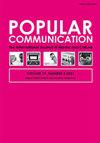Representing rape culture on teen television
IF 1.8
Q2 COMMUNICATION
引用次数: 6
Abstract
ABSTRACT Increasing cultural attention to sexual assault in the U.S. has raised questions about consent, leading some states to implement “yes means yes” laws. In order to provide insight into how mainstream discourse take into account feminist understandings of sexual violence and affirmative consent, this article considers representations of rape culture and affirmative consent in two recent teen television programs, 13 Reasons Why (2017-2020) and Sweet/Vicious (2016–2017). Both shows reference sexual assault in nearly every episode, constructing a world in which rape culture is rampant. In portraying rape as lack of consent, as opposed to outright refusal or resistance, the shows do the important work of emphasizing why affirmative consent is essential. While progressively suggesting that rape culture necessitates affirmative consent, 13 Reasons Why and Sweet/Vicious simultaneously contribute to rape culture by relying on the long-standing trope that, when it comes to girls and sexual assault, “no” may mean “yes.”在青少年电视节目中代表强奸文化
摘要:在美国,越来越多的文化关注性侵犯,引发了人们对同意的质疑,导致一些州实施了“是即是”的法律。为了深入了解主流话语如何考虑到女权主义对性暴力和平权同意的理解,本文考虑了最近两个青少年电视节目《13个原因》(2017-2020)和《甜蜜/邪恶》(2016-2017)中强奸文化和平权赞同的表现。这两部剧几乎每一集都提到性侵,构建了一个强奸文化泛滥的世界。这些节目将强奸描述为缺乏同意,而不是直接拒绝或抵抗,强调了为什么肯定同意至关重要。虽然逐渐表明强奸文化需要肯定同意,但《13个为什么》和《甜蜜/邪恶》同时也助长了强奸文化,因为它们依赖于一个长期存在的比喻,即当涉及到女孩和性侵时,“不”可能意味着“是”
本文章由计算机程序翻译,如有差异,请以英文原文为准。
求助全文
约1分钟内获得全文
求助全文

 求助内容:
求助内容: 应助结果提醒方式:
应助结果提醒方式:


